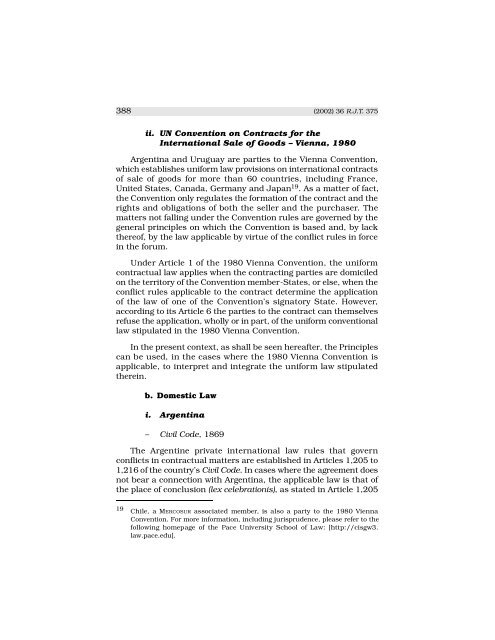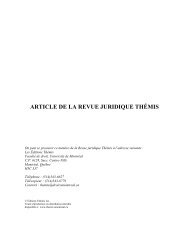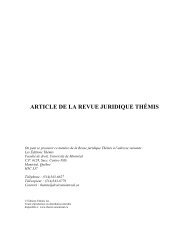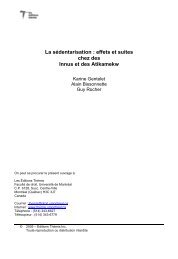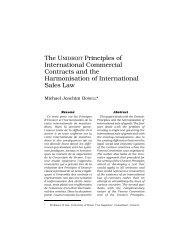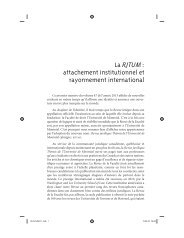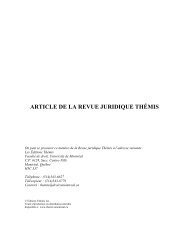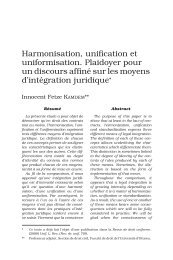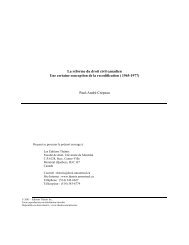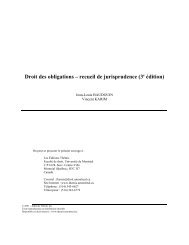The UNIDROIT Principles of International Commercial Contracts and ...
The UNIDROIT Principles of International Commercial Contracts and ...
The UNIDROIT Principles of International Commercial Contracts and ...
You also want an ePaper? Increase the reach of your titles
YUMPU automatically turns print PDFs into web optimized ePapers that Google loves.
388 (2002) 36 R.J.T. 375<br />
ii. UN Convention on <strong>Contracts</strong> for the<br />
<strong>International</strong> Sale <strong>of</strong> Goods – Vienna, 1980<br />
A rgentina <strong>and</strong> Uruguay are parties to the Vienna Convention,<br />
which establishes uniform law provisions on international contracts<br />
<strong>of</strong> sale <strong>of</strong> goods for more than 60 countries, including France,<br />
United States, Canada, Germany <strong>and</strong> Japan 19 . As a matter <strong>of</strong> fact,<br />
the Convention only regulates the formation <strong>of</strong> the contract <strong>and</strong> the<br />
rights <strong>and</strong> obligations <strong>of</strong> both the seller <strong>and</strong> the purc h a s e r. <strong>The</strong><br />
matters not falling under the Convention rules are governed by the<br />
general principles on which the Convention is based <strong>and</strong>, by lack<br />
there<strong>of</strong>, by the law applicable by virtue <strong>of</strong> the conflict rules in force<br />
in the forum.<br />
Under Article 1 <strong>of</strong> the 1980 Vienna Convention, the uniform<br />
contractual law applies when the contracting parties are domiciled<br />
on the territory <strong>of</strong> the Convention member-States, or else, when the<br />
c o n flict rules applicable to the contract determine the application<br />
<strong>of</strong> the law <strong>of</strong> one <strong>of</strong> the Convention’s signatory State. However,<br />
according to its Article 6 the parties to the contract can themselves<br />
refuse the application, wholly or in part, <strong>of</strong> the uniform conventional<br />
law stipulated in the 1980 Vienna Convention.<br />
In the present context, as shall be seen hereafter, the <strong>Principles</strong><br />
can be used, in the cases where the 1980 Vienna Convention is<br />
applicable, to interpret <strong>and</strong> integrate the uniform law stipulated<br />
therein.<br />
b. Domestic Law<br />
i. Argentina<br />
– Civil Code, 1869<br />
<strong>The</strong> Argentine private international law rules that govern<br />
conflicts in contractual matters are established in Articles 1,205 to<br />
1,216 <strong>of</strong> the country’s Civil Code. In cases where the agreement does<br />
not bear a connection with Argentina, the applicable law is that <strong>of</strong><br />
the place <strong>of</strong> conclusion (lex celebrationis), as stated in Article 1,205<br />
19 Chile, a ME R C O S U R associated member, is also a party to the 1980 Vi e n n a<br />
Convention. For more information, including jurisprudence, please refer to the<br />
following homepage <strong>of</strong> the Pace University School <strong>of</strong> Law: [http://cisgw3.<br />
law.pace.edu].


